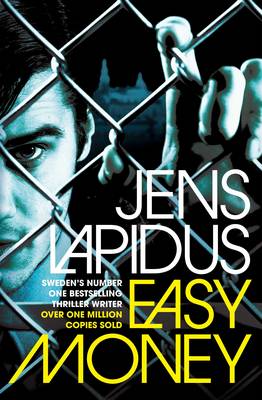
EURO CRIME
Reviews

Lapidus, Jens - 'Easy Money' (translated by Astri von Arbin Ahlander)
Trade Paperback: 400 pages (Feb. 2012) Publisher: Macmillan ISBN: 0230761100
EASY MONEY is the first in the hugely successful Stockholm Noir trilogy of books by Jens Lapidus. Lapidus is a well known Swedish criminal lawyer, whose courtroom experiences have informed his work, which he has deliberately focused away from the traditional police procedural model.
This book follows the stories of three men attracted to the seeming easy money they can obtain from the cocaine trade: JW, the "Swedish Talented Mr Ripley", Jorge, a Chilean incarcerated on drugs charges, and Mrado, a Serbian Mafia hitman, with chapters of the book alternating the points of views of these three characters, interspersed with extracts from court documents relating to the offences carried out during the course of this book. JW is a young student from a working class provincial background who has decided to reinvent himself as one of the Stockholm brat pack, funding his nights out with high society by working the night shifts as a taxi driver with Abdulkarim's taxi firm. Jorge's family emigrated to Sweden when he was a child, and he grew up in difficult circumstances in Sollentuna, an unlovely Stockholm suburb, and took to a life of crime, ending up in prison after dealing drugs with Mrado and the Yugoslavian Mafia. Mrado's family also emigrated to Sweden, but Mrado went back to Yugoslavia to serve under the notorious Arkan in the war, then returned to continue his work near the top of the Yugoslavian Mafia tree.
The plotline follows all three protagonists as they are drawn further into the drugs trade, money laundering and into inter- and intra-gang warfare; JW starts selling cocaine for Abdulkarim, Jorge manages to escape from prison, and resorts to drug selling to earn a living, and Mrado becomes involved in a power struggle with his boss, Radovan, the "godfather" of the Yugo Mafia. All three also have a thirst for their own form of justice; JW's older sister, Camilla, has vanished, Jorge is determined to wreak his revenge on Radovan and his cronies, and Mrado is keen to assert himself against Radovan. Eventually the personal and professional strands of all these characters' lives collide messily, with the action taking place against a backdrop of increased violence and conflict between the Yugo Mafia and up and coming criminal gangs. But it's not only the other gangsters our protagonists need to be way of: the Swedish police are attempting to exploit divisions in the underworld, and are making a push via Operation Nova to arrest a hit list of their top 150 gangsters.
Once the main characters have made their easy money, the practical question then arises as how to spend it without attracting the attention of the authorities. Both Mrado and JW are much preoccupied with how to launder their money, and Lapidus makes the point very neatly about the narrowing boundaries between the legal and illegal economies via money laundering. His characters clean money from illegal drug, prostitution and protection rackets by means of ostensible investments in innocuous seeming enterprises such as video stores and restaurants, and by setting up complex networks of offshore companies to funnel money back to Sweden.
EASY MONEY is a gripping, hard boiled crime novel, which has a real ring of authenticity due to the author's professional familiarity with the Swedish underworld. Characterisation and plotting are fast and furious, and show the moral vacuum of gangster life down to the nitty gritty of the gym and drug regime of Mrado, and the banal label-consciousness of JW. This book is also distinctive from a stylistic point of view, as the author has consciously chosen a fast, punchy realist style salted with slang to mirror the aggressive lifestyle of his characters. Much credit lies with the translator, Astri von Arbin Ahlander, for managing to find English equivalents for the vast array of specialist crime and other slang terms.
EASY MONEY represents a new development in Scandinavian crime fiction, a breakaway from the more typical socially conscious police procedurals, or books that feature journalists as proxy sleuths. This novel reinforces themes of much of the recent quality fiction and non-fiction regarding the black economy such as Collusion, McMafia and Gomorrah, with regard to the way organised crime is mirroring more and more the language and techniques of big business, and how desire for money can override conventional ethnic or traditional gang boundaries. I look forward to the translation of the next two books in this trilogy.Laura Root, England
February 2012
More European crime fiction reviews can be found on the Reviews page.